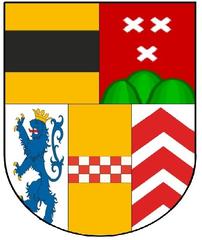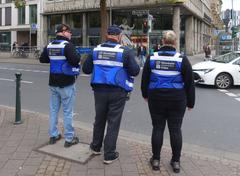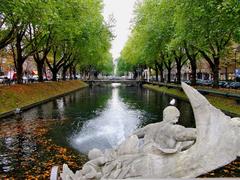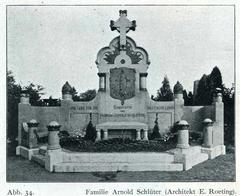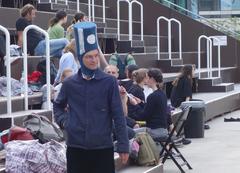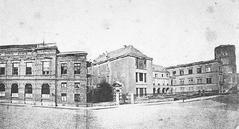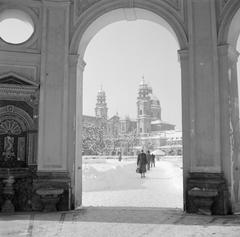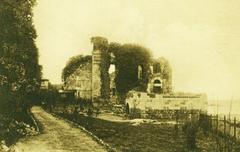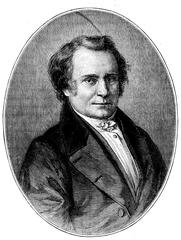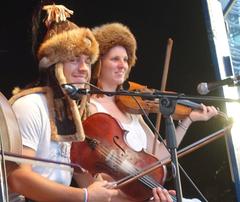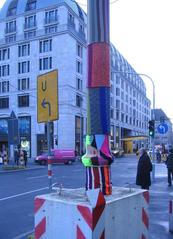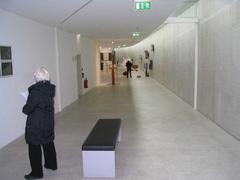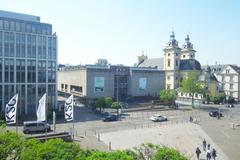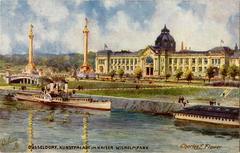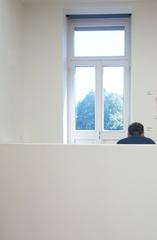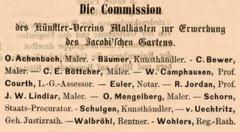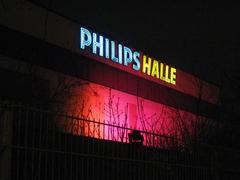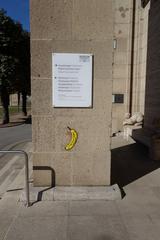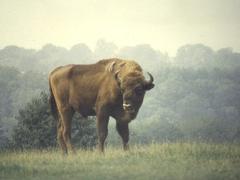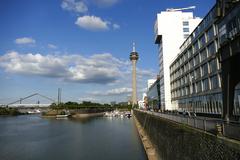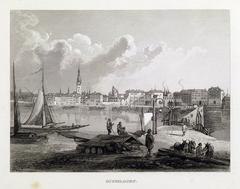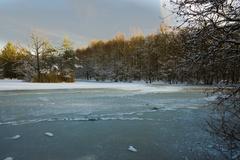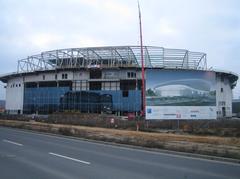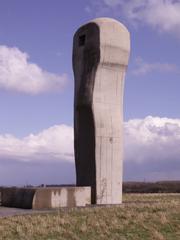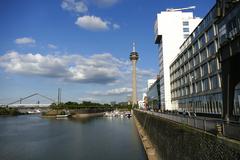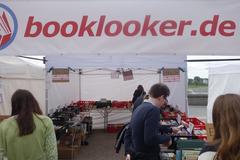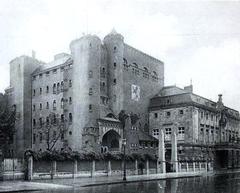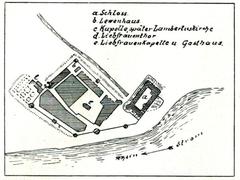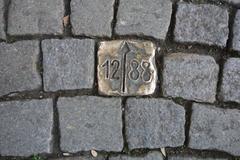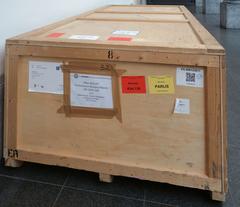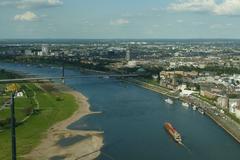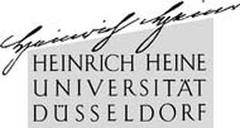Comprehensive Guide to Visiting Rotthäuser Bachtal Düsseldorf Germany
Date: 31/07/2024
Introduction
The Rotthäuser Bachtal, located just east of Düsseldorf, Germany, is an exceptional destination that offers a unique blend of historical significance, natural beauty, and ecological diversity. Nestled within the European Natura 2000 network, this nature preserve has been protected since 1984, ensuring the conservation of its valuable and threatened species and habitats (Düsseldorf.de). The valley’s rich history, which includes medieval trade routes such as the ‘Mauspfad’ and ‘Hohlweg,’ intertwines with its industrial heritage, symbolized by the remnants of the massive glass factory in the nearby Gerresheim district (Natur Erleben NRW) (Andrew Hammel).
The Rotthäuser Bachtal’s ecological importance is underscored by its diverse biotopes, which include moist tall herb communities, beech forests, and extensive reed beds that provide habitats for various bird species and rare nocturnal moths. The valley’s geological features, such as its western bank’s steep cliffs and the eastern flank’s flat pastures, contribute to its unique landscape (Natur Erleben NRW). For visitors, the Rotthäuser Bachtal offers well-marked hiking trails, historical landmarks, and a serene escape from urban life, making it a must-visit destination for nature enthusiasts and history buffs alike (Komoot).
Table of Contents
- Introduction
- Historical Background
- Industrial Heritage
- Ecological Significance
- Conservation Efforts
- Geological Features
- Cultural Impact
- Visitor Information
- Modern-Day Relevance
- FAQ
- Call to Action
- Conclusion
Historical Background
The Rotthäuser Bachtal has been protected as a nature preserve since 1984 and is part of the European Natura 2000 network, which aims to safeguard Europe’s most valuable and threatened species and habitats (Düsseldorf.de). The valley was historically significant as it was traversed by important medieval trade routes, such as the ‘Mauspfad,’ connecting Siegburg to Duisburg (Natur Erleben NRW). Another notable route was the ‘Hohlweg,’ a medieval path from Schäpershof to Gerresheim, highlighting the valley’s historical importance in commerce and connectivity.
Industrial Heritage
The Rotthäuser Bachtal is also linked to Düsseldorf’s industrial history. The nearby Gerresheim district once housed a massive glass factory, attracting workers from across Germany. Though the factory has been demolished for new apartments, the former water tower remains as a protected landmark, symbolizing the area’s industrial past (Andrew Hammel).
Ecological Significance
The ecological importance of the Rotthäuser Bachtal is immense. The valley features diverse biotopes, such as moist tall herb communities, beech forests, and alder-ash and softwood floodplain forests, making it a biodiversity hotspot (Natur Erleben NRW). The western bank’s steep cliffs and the eastern flank’s flat pastures contribute to the area’s rich ecological tapestry (Andrew Hammel).
Conservation Efforts
The Rotthäuser Bachtal is part of the Natura 2000 network, aimed at protecting Europe’s most valuable and threatened species and habitats. The valley’s moist tall herb communities, beech forests, and alder-ash and softwood floodplain forests are all designated as protected biotopes (Natur Erleben NRW). Various abandoned pond systems in the valley have developed into extensive reed beds, providing habitats for bird species like the reed bunting, marsh warbler, and water rail, along with rare nocturnal moth species.
Geological Features
Geologically, the Rotthäuser Bachtal is fascinating. The valley’s western side is significantly flatter, while the eastern side consists of typical yellow marine sands, deeply eroded in places to create erosion channels. These geological features contribute to the valley’s unique landscape and ecology (Düsseldorf.de).
Cultural Impact
The Rotthäuser Bachtal is a cultural treasure for the local community, popular for outdoor activities like hiking and cycling. Well-marked trails and diverse scenery make it a favorite spot for nature enthusiasts, especially in the fall when the foliage changes color (Andrew Hammel). Its proximity to Düsseldorf offers an accessible escape from urban life, providing a serene and natural setting for relaxation and recreation (Komoot).
Visitor Information
Visiting Hours
The Rotthäuser Bachtal is open to visitors year-round. While there are no specific visiting hours, it’s recommended to visit during daylight for safety and to fully appreciate the natural beauty.
Tickets
There is no entrance fee to visit the Rotthäuser Bachtal. However, some guided tours or special events may require tickets. Check the official Düsseldorf tourism page for updated information.
Travel Tips
- Accessibility: The trails are well-maintained, but some areas can be challenging. Wear suitable footwear and consider bringing a map or GPS device.
- Nearby Attractions: Explore nearby attractions such as the Düsseldorf city center, Gerresheim district, and other nature reserves in the region.
- Public Transport: The valley is accessible via public transport from Düsseldorf. Check local transit schedules for the best routes.
Modern-Day Relevance
Today, the Rotthäuser Bachtal remains a vital natural and recreational area for Düsseldorf residents and visitors. Its protected status ensures the preservation of its unique ecological and geological features for future generations. Historical routes and industrial heritage add layers of cultural significance, making it a multifaceted destination.
FAQ
What are the visiting hours for Rotthäuser Bachtal?
The Rotthäuser Bachtal is open year-round, with no specific visiting hours. It is best visited during daylight hours.
Are there guided tours available at Rotthäuser Bachtal?
Yes, guided tours are available. Check the official Düsseldorf tourism page for details.
Is there an entrance fee for the Rotthäuser Bachtal?
No, there is no entrance fee, but some guided tours or special events may require tickets.
Call to Action
Explore the Rotthäuser Bachtal and immerse yourself in its rich history, ecological diversity, and natural beauty. For more information, download our mobile app Audiala, or follow us on social media for updates. Don’t forget to check out our related posts for more exciting destinations!
Conclusion
In conclusion, the Rotthäuser Bachtal stands as a multifaceted destination that harmoniously blends historical significance, industrial heritage, and ecological diversity. Its protected status within the Natura 2000 network ensures that its unique landscapes and habitats will be preserved for future generations. Visitors can immerse themselves in the valley’s rich history, explore its scenic hiking trails, and enjoy the tranquil natural beauty that it offers year-round. Whether you are an avid hiker, a history enthusiast, or simply seeking a peaceful retreat, the Rotthäuser Bachtal provides a comprehensive experience that caters to diverse interests. For more information and updates, visitors can refer to official sources and local tourism pages (Düsseldorf.de) (Komoot).
References
- Düsseldorf.de. (n.d.). Rotthäuser Bachtal. https://www.duesseldorf.de/stadtgruen/landschaft-naturschutz/naturschutzgebiete/rotthaeuser-bachtal
- Natur Erleben NRW. (n.d.). Rotthäuser und Morper Bachtal. https://www.natur-erleben-nrw.de/natura-2000/regionen-und-gebiete-in-nrw/details/rotthaeuser-und-morper-bachtal/
- Hammel, A. (2018, October 17). Cycling the Rotthäuser Bachtal. https://andrewhammel.wordpress.com/2018/10/17/cycling-the-rotthauser-bachtal/
- Komoot. (n.d.). Rotthäuser Bachtal Highlight. https://www.komoot.com/highlight/75979

